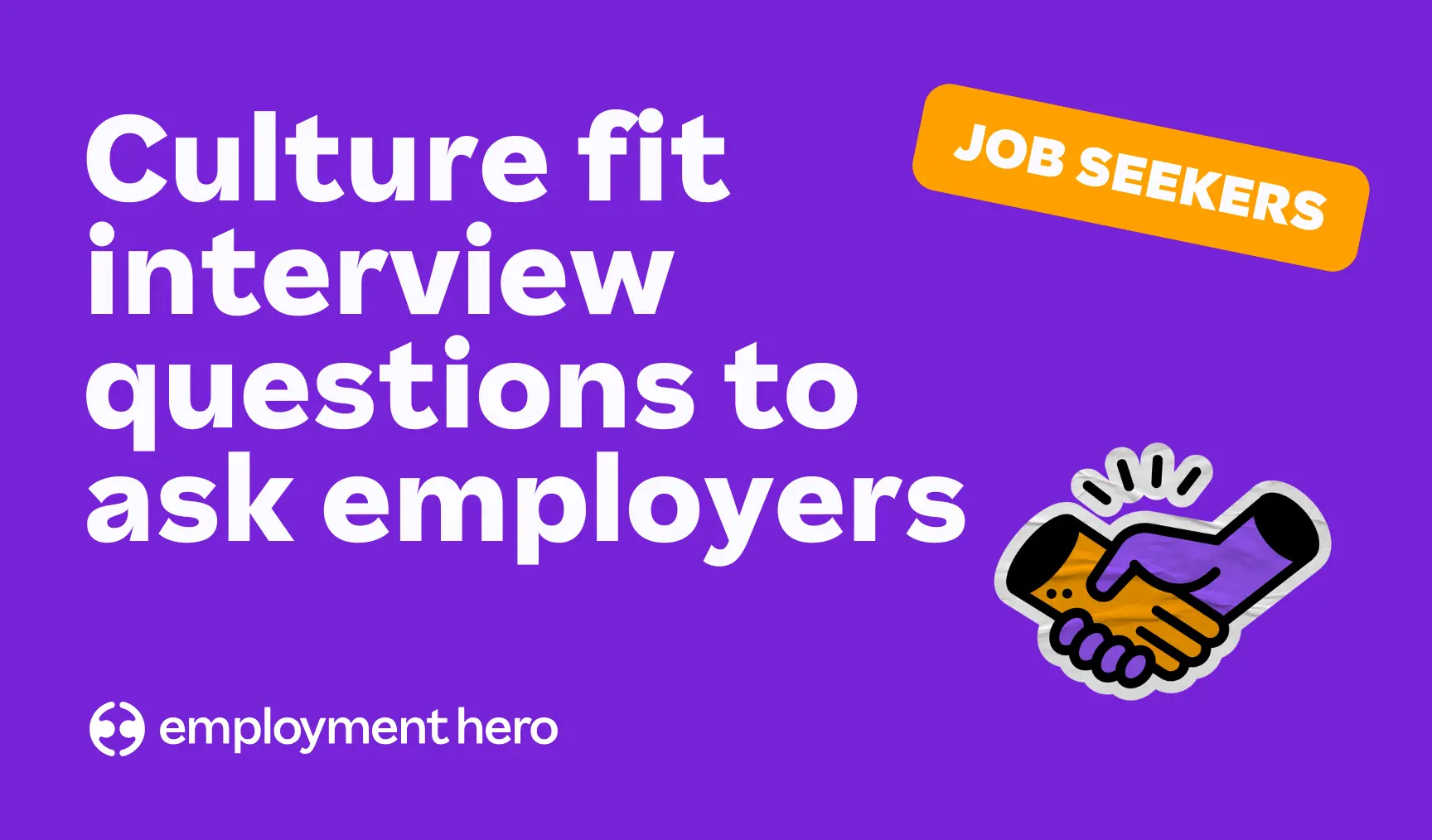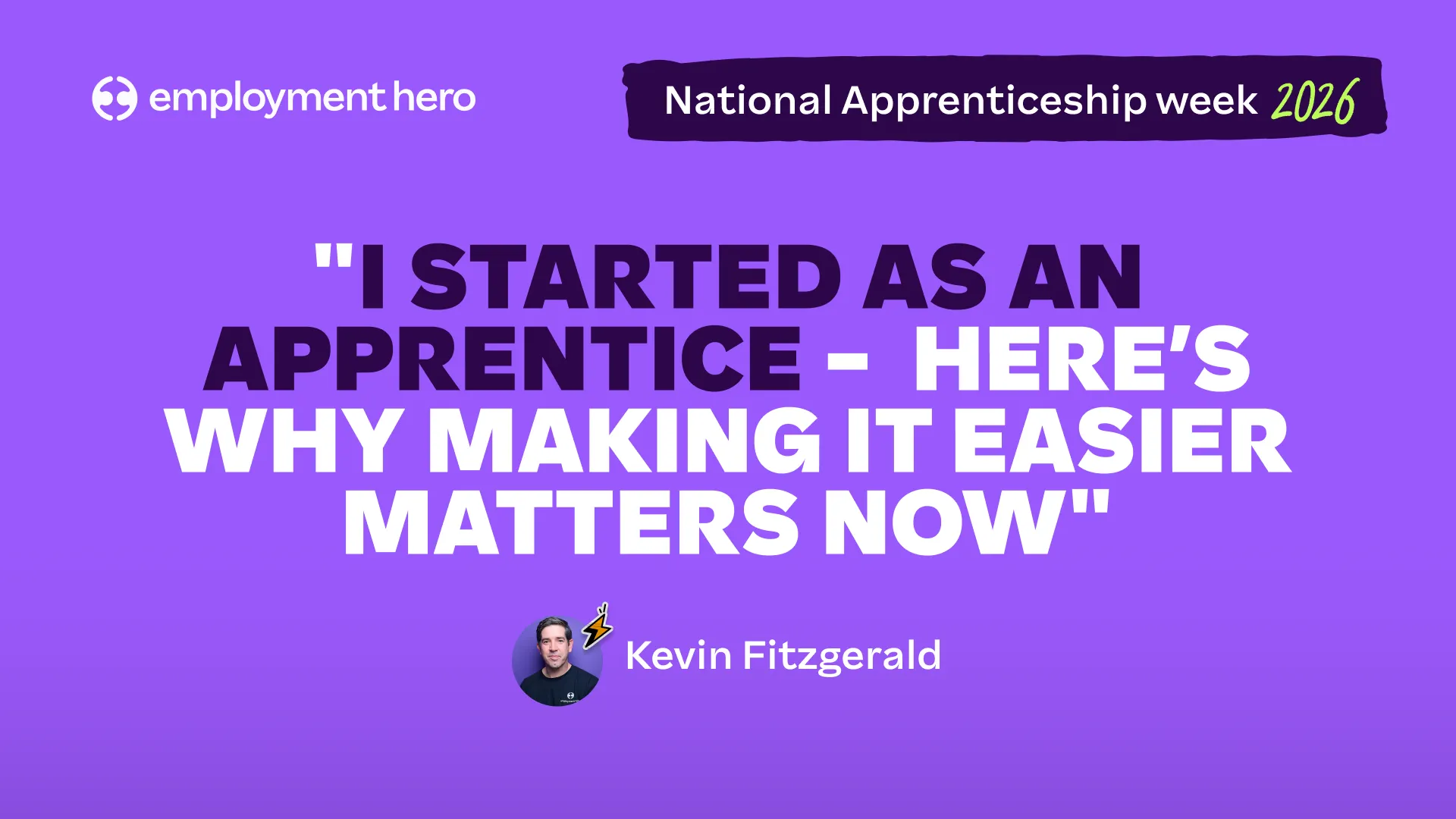Culture fit interview questions to ask employers in the UK
We’ve wrapped up five critical things your recruitment strategy might be missing so you can feel confident in your hiring decision, every time.

Contents
When applying for jobs, assessing culture fit is as important as evaluating the job role itself. UK-based workplaces increasingly prioritise psychological safety, shared values and diversity, making these aspects critical to long-term career satisfaction. But how can you gauge whether a potential employer’s culture aligns with your preferences and expectations?
This guide will help you explore the concept of cultural fit, identify red flags during interviews and provide you with key questions to ask employers. We’ll also introduce Employment Hero’s SmartMatch tool, designed to connect you with companies that fit your unique needs.
What is a culture fit in the UK?
Culture fit refers to how well a potential employee’s values, preferences and work style align with the ethos of their workplace. However, culture fit is no longer about “blending in”. UK workplaces increasingly celebrate “culture add,” where complementary skills and perspectives enhance the existing company culture.
Cultural alignment fosters collaboration, better job performance and longer employee retention. A positive culture that promotes psychological safety, diversity, and shared values ensures that employees thrive not just professionally but personally as well.
Why culture fit is vital to UK workplaces
From financial hubs in London to dynamic startups in Manchester, UK workplaces cover a wide spectrum of expectations. No matter the sector, here’s why evaluating culture fit is essential:
- Psychological safety builds trust and encourages innovation by creating spaces where employees can express themselves without fear of judgment.
- Shared values align individual goals with the company’s mission, enhancing motivation and engagement.
- Diversity and inclusivity fuel innovation and improve team performance through varied perspectives and dynamic collaboration.
Many UK companies are increasingly transparent about their cultural commitments, so start your evaluation even before the interview process.
Researching company culture before the interview
Understanding a company’s culture begins well before your first one-on-one with a hiring manager. Use these strategies to uncover the values and practices of your prospective employer:
- Visit the company’s website to explore their mission statement, values and approach to employee welfare.
- Leverage tools like Glassdoor UK to gather insights from current and past employee reviews.
- Engage on LinkedIn to see how the organisation interacts with staff, job seekers and partners.
- Observe public statements regarding workplace diversity and responses to challenging events—this can reveal how they act under pressure.
Key interview questions for cultural fit
Don’t wait until after you’ve accepted the offer to uncover whether your prospective employer values psychological safety, inclusivity or shared leadership. During the interview, ask these questions to evaluate if the company aligns with your expectations:
1. Values alignment
- Can you describe how the company’s core values manifest in day-to-day operations?
- How does leadership ensure that these values are prioritised at every level?
2. Psychological safety
- How does the workplace promote psychological safety among team members?
- Can you share examples of how the company handles employee concerns?
3. Diversity and inclusion
- What specific initiatives does the company have in place to promote diversity and inclusion?
- How does the team ensure that differing perspectives are heard and valued?
4. Leadership and communication
- How does the leadership team handle feedback from employees?
- What is the most common communication style within the team?
5. Flexibility and well-being
- Can you highlight any support programs for employee well-being?
- What options exist for flexible working arrangements, such as remote work?
6. Growth and innovation
- What professional development opportunities are provided to employees?
- How does the company foster a culture of continuous learning and innovation?
These targeted questions showcase your motivation to contribute meaningfully while doubling as tools to assess whether the company’s ethos resonates with your values.
Recognising red flags in company culture
Even in well-prepared interviews, there may still be signs of potential cultural misalignment. Stay alert to these warning signals:
- Lack of specifics when describing diversity or psychological safety initiatives.
- High employee turnover, which may indicate dissatisfaction or poor management.
- Overly rehearsed responses that don’t feel genuine or flexible.
- Disrespectful communication styles observed between employees or during your interaction.
Equally, trust your instincts during the interview. If something feels off despite the surface-level appeal, it might warrant a deeper investigation.
How Employment Hero simplifies the culture fit search
Finding a company that aligns with your cultural expectations shouldn’t be a guessing game. Employment Hero Jobs uses AI to help employers find you based on your profile and their job listing.
Frequently Asked Questions
A cultural fit question in an interview asks about your work style, values and preferences to see if they match the company’s environment. It helps the employer (or you the candidate) to understand if you’ll thrive in their team and if your approach to work aligns with their culture.
To assess company culture during an interview, pay close attention to the interviewer’s responses to your questions about values, communication and flexibility. Observe the workplace environment if you’re on-site – how do people interact? Also, notice the general tone of the conversation and whether the interviewer seems genuine and open. Look for consistency between what they say and how they act, and trust your gut feeling about the overall atmosphere.
You’ll know if a company is a good cultural fit if their values and how they work align with your own. Think about what’s important to you in a job – do you prefer working alone or in teams? Do you like clear rules or more freedom? During the interview, see if the company’s answers to your questions about values, communication and flexibility match your preferences. If you feel comfortable, understood and excited about their approach, it’s likely a good fit.
Culture fit is about how well you “blend in” with a company’s existing ways of working and values. It often means looking for someone who already thinks and acts like the current team. Culture add, on the other hand, focuses on bringing in new ideas, perspectives,and skills that make the team stronger and more diverse. Instead of just fitting in, culture add helps the company grow and innovate by welcoming different viewpoints.
Yes, it is perfectly acceptable to ask about diversity and inclusion in an interview. Asking these questions shows your interest in working for a company that values different perspectives and creates a welcoming environment for everyone. It helps you understand if the company’s commitment to diversity and inclusion matches your own values, which is important for finding a workplace where you can feel comfortable and contribute your best.
If you don’t feel a cultural fit after an interview, it’s a good idea to trust that feeling. It means your values or how you like to work might not match the company’s. It’s better to recognise this early than to start a job where you don’t feel comfortable or can’t do your best work. Use this information to help you decide if the job is truly right for you before accepting an offer.
While most UK employers recognise the importance of culture, the extent to which they care about culture fit can vary. Larger, more established companies often have defined values and dedicated efforts to ensure new hires align with their ethos. Smaller businesses or those in fast-paced industries might prioritise skills and immediate contributions more. However, with the increasing focus on employee well-being, retention and psychological safety, a positive culture is becoming a key factor for more and more UK workplaces.
Related Resources
-
 Read more: 7 Ways Employment Hero Can Help You Retain Top Talent
Read more: 7 Ways Employment Hero Can Help You Retain Top Talent7 Ways Employment Hero Can Help You Retain Top Talent
Contents Retaining top talent in 2026 is about more than providing a positive workplace culture; employees are looking for jobs…
-
 Read more: Bradford Factor Alternatives: Practical Ways to Manage Absence in 2026
Read more: Bradford Factor Alternatives: Practical Ways to Manage Absence in 2026Bradford Factor Alternatives: Practical Ways to Manage Absence in 2026
Discover smarter absence management strategies for 2026. Explore Bradford Factor alternatives that focus on employee wellbeing and building a resilient…
-
 Read more: Government red tape risks blocking youth jobs as SMEs look to access apprenticeship scheme
Read more: Government red tape risks blocking youth jobs as SMEs look to access apprenticeship schemeGovernment red tape risks blocking youth jobs as SMEs look to access apprenticeship scheme
February 9, 2026: New Employment Hero research finds 73% of SME leaders intend to leverage new Government apprenticeship schemes following…



















